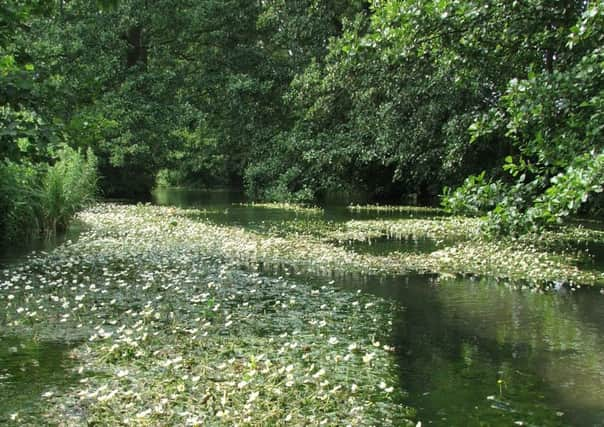Unique system streaming with life


Our most northerly chalk river system starts life as a series of springs and streams in the Yorkshire Wolds, where the Yorkshire Wildlife Trust is working with landowners, volunteers and others to restore and protect this unique environment.
Jon Traill, the Trust’s living landscapes manager for the Wolds and Holderness, likens the region’s chalk stream ecosystems to the rainforests of South America, insisting that they’re just as diverse.
Advertisement
Hide AdAdvertisement
Hide AdHe shows me a stretch of crystal clear chalk stream on private land just outside Driffield, where the banks are scattered with water forget-me-nots, fool’s watercress, water speedwell, lesser water parsnip and a host of other species unique to this type of habitat.
The watercourse is home to, among others, bullhead fish, brown trout, lamphrey, water voles, otters and kingfishers.
Jon’s role is to bring together the various parties with an interest in protecting chalk streams.
“My job is to work outside of the Trust’s land holdings in the wider countryside, influencing and helping people in the decisions that they make. As much of East Yorkshire is farmland, it means that I spend most of my time working with farmers, offering help and support with the management of wetland habitats in particular.
Advertisement
Hide AdAdvertisement
Hide Ad“I’ve been working with landowners in the Driffield area for more than 15 years and the chalk stream project evolved from this.”
The YWT owns two chalk stream sites in the Driffield area; the Snakeholm Pastures reserve at Wandsford and Skerne Wetlands. The latter is a former fish farm bought by the Trust three years ago and its ongoing transformation from a commercial site into a nature reserve has given the chalk stream project great impetus.
The two nature reserves and the privately owned sites are located within a five-mile radius of Driffield, covering thousands of hectares of land and with around 20km of chalk stream meandering through them.
Jon said: “The network of chalk streams in the Driffield area is all connected and what happens up stream affects what’s going on downstream. They emerge from the chalk aquifer of the Wolds as springs and join up to form water courses, eventually becoming the River Hull.
Advertisement
Hide AdAdvertisement
Hide Ad“We realised that the best way to protect this habitat was to start at the top to improve the headwaters so that downstream benefits too. To make this happen, we need the buy-in of landowners.”
Jon and his colleagues have been working with eight individual landowners in the area, including John Fenton of Elmswell Farms, who has helped install silt traps to intercept pollutants previously washed down from the nearby main road into the stream on his land.
“The work was started in the late 1960s by my late father-in-law, who reclaimed the stream from the cattle because the bank sides had pretty much disappeared,” John said. “He restored the channel and the work has continued from there. Our emphasis here is on keeping the water as clear as possible and that starts with how we farm.”
Jon Traill helped Elmswell Farms to access grant funding towards the cost of carrying out improvements.
Advertisement
Hide AdAdvertisement
Hide AdJohn Fenton added: “We’re very fortunate to have someone to work with on this project. We’re only custodians for as long as we’re here and it’s our duty to pass it on to the next generation, hopefully in a better state than when we took it over.”
The YWT has secured almost £500,000 from WREN, Natural England, the Environment Agency and others towards the project so far.